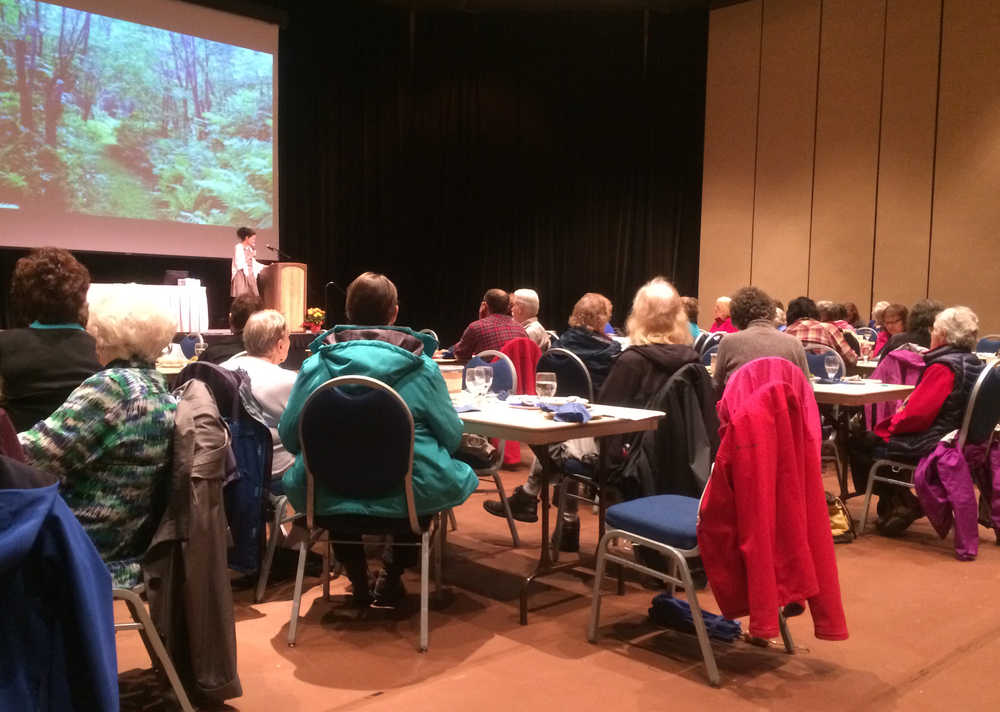More than 100 people seated at tables in Centennial Hall sat up straight in their chairs, and in unison, breathed out as one. With their eyes closed, they chanted the word “peace,” the sound washing over those gathered like rolling and receding waves. Next, people tapped their fingers in unison with four different tones, chanting in rising and falling volume. The tones lowered until the whole room went silent.
After several minutes, a voice came over the speakers, and those gathered looked up to Dr. Astrid Pujari standing on Centennial Hall’s main stage. The audience had just participated in her meditation exercises, part of her “Stress Less: Mindfulness and Cancer Prevention,” the keynote presentation for the Cancer Connection’s health forum Oct. 17.
Well-liked from previous talks, Cancer Connection invited Pujari to visit from Seattle to speak at the forum on cancer. Pujari, a big believer in the connection between mind and body, spoke on the value of having less stress in people’s lives for their overall health and for those suffering or recovering from cancer.
“What you think and what you feel also affects your body,” said Pujari, who referred to numerous case studies to back up her point on the correlation between meditation and improved health.
While there are ways to cut stressful things from life, they aren’t inescapable, so as Pujari advised, people must choose how to respond to stress. Pujari said when a stressful trigger occurs, people should not simply react, but respond in a mindful way. Pujari said everyone has a choice on how they respond to stress, but responding in a positive way isn’t always easy – people have to condition themselves.
“Do you expect yourself to run a marathon tomorrow?” Pujari said, illustrating the point that a person must practice responding to stress just as they would practice for a race or develop a skill. For mindfulness practice, Pujari had the audience practice two different meditation exercises for the close of her presentation.
The lunch provided before Pujari’s talk was itself a presentation on healthy eating. Abby’s Kitchen prepared a meal consisting of a salad made of leafy greens, veggies and quinoa with a garnish of pear and a whole grain roll as a side. For desert, there were chocolate cupcakes made with beets. The recipes were provided so attendees could replicate the healthy dishes at home.
Healthy eating is a preventative measure against cancer, which was also the theme of Kari Natwick’s presentation earlier in the day. Natwick, a nutritionist at Bartlett Regional Hospital, said to attendees that one-third of 572,000 deaths caused by cancer are due to diet, weight and physical inactivity.
She encouraged the audience to move to a whole food, plant-based diet. Natwick said that five servings of fruits and veggies a day reduces the risk of cancer by at least 20 percent. She also recommended people control their portion size of certain foods, like red meats, and advised people to check out choosemyplate.org to see what their ideal plate should look like.
On physical activity, Natwick said people should exercise 30 minutes per day at least three times a week.
The exercise and eating healthy advice was echoed by Maggie Miller, the only genetic oncology counselor in Alaska, before she dove into her presentation on genetics and cancer. She said genetics is one of three main causes of cancer, the other being lifestyle factors such as diet and physical activity, and environmental factors such as chemicals and radiation. She spoke on the basics of cancer, how genes impact it and what a genetic oncology counselor does.
Other presentations included in the health forum were “New Advances in Cancer Treatment” by Dr. Eugene Huang, a radiation oncologist at Southeast Radiation Oncology Center, and “Harnessing the Power of the Mind for Cancer Prevention”, by Colleen Torrence, an LPC counselor.
For more information on Cancer Connection and their upcoming events, go to cancerconnectionak.org.
• Contact Clara Miller at 523-2243 or at clara.miller@juneauempire.com.

